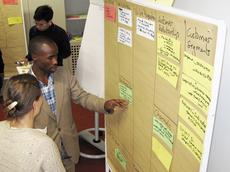Food for thought
As the world’s resources grow scarce, finding sustainable ways to reduce and avoid food waste and loss climbs to the top of the global priority list. The “Our Common Food” competition supports this initiative. Of the 54 participants, eight finalists were chosen; two of them are from ETH Zurich.

In light of the growing scarcity of the world’s resources, reducing and avoiding food losses and waste is becoming an issue that everyone needs to be conscious of. The Food and Agriculture Organisation (FAO) of the United Nations estimates around 1.3 billion tonnes of all food produced is wasted or lost each year. On a global scale that’s about 750 billion USD in wastage a year – the equivalent of Turkey’s GDP! Switzerland alone throws 2 million tonnes of edible food away a year, emitting the same amount of CO2 as 1.5 million cars or 36 per cent of all cars in the country. On the other side of the coin, approximately 870 million people worldwide are undernourished, 90 per cent of which are living in developed countries.
Hence, the conception of World Food Day. If you’re wondering what this day represents, it is certainly not a day to go out and eat all your favourite foods in one go – quite the contrary. World Food Day was established by the FAO in 1979 and is recognised each year on October 16, the day on which the Organisation was founded in 1945. On this day we are encouraged to put our heads together to find effective and sustainable solutions to food nutrition and security, and to heighten our awareness about hunger, malnutrition and poverty around the globe.
ETH competes for a good cause
Paying attention to food and nutrition security, food production and processing is exactly what finalists Coraline Praz, Anna Beerli and Ima Mulyama Zainuddin from ETH Zurich did as they submitted their projects to the “Our Common Food” competition. The competition was organized by the Swiss National FAO Committee, under the patronage of the Swiss Federal Office for Agriculture and the Swiss Development and Cooperation Agency. The awards ceremony was hosted at ETH Zurich, which is also a partner.
Contestants from
Switzerland and abroad were asked to develop an inspiring idea for a product,
service or campaign that reduces food loss or waste within the food supply
chain, focusing on either food waste in Switzerland or on postharvest losses in
developing countries. The jury had a tough task, receiving 54 ideas from 14
different countries. Moreover, they were so impressed by the creativity of the
submissions that they selected eight instead of six finalists.
“We liked the idea of the competition,” says ETH finalist Anna Beerli, a Master student of Food and Resources Economics. “It’s a subject so important to our society. Just think about it – food waste concerns our daily lives and it is something that we can proactively improve.” In partnership with Coraline Praz, Master student of Crop Sciences, Beerli submitted the project ‘Rest-Au-Rad’ in the food waste category. The idea behind ‘Rest-Au-Rad’ is to introduce a bike delivery courier in Zurich that collects freshly prepared excess food from caterers, restaurants and bakeries and allocates it to final consumers with limited or no financial. “We came up with the concept after seeing all the untouched leftovers at an event we attended last summer. We were on our way to another event and had the spontaneous idea to bring the remaining food with us. The event organisers liked the idea,” explains Praz.
Ima Mulyama Zainuddin, an ETH PhD student of Plant Biotechnology, submitted her idea in the post-harvest category. “Deterioration in cassava (PPD) is one of major constraints limiting its economic and industrial potential,” explains Zainuddin. “Using a natural source of vitamin C can potentially be a cheap, easy and simple solution to delay deterioration and reduce post-harvest losses of cassava.” This method could be implemented in Indonesia, Zainuddin’s homeland, and would have immediate impact for Indonesian cassava farmers and processors.
And the winner is…
The prize ceremony took place on
October 15, just in time for World Food Day. Keynote speakers, including Martin Dahinden, Director-General of the Swiss Agency for
Development and Corporation, Fritz Schneider, President of the Swiss National FAO Committee (CNS-FAO) and Ian Roberts,
Chief Technical Officer, Bühler Group, came to congratulate the participants
and to speak on behalf of the food loss and waste initiative. The overall
message was clear – the problem is too great for one entity or organisation to
solve. It demands collaboration, awareness and education.
A grand applause went out
the two winning projects: ‘Cloud Kitchen’, a web-based application that aims to
reduce food waste by increasing awareness as it enables the consumer to store the
contents of his or her refrigerator and cupboards on a smartphone; and “A
village-based grain bank”, a simple business model that offers quality grain
handling and storing services to small rural famers in Kenya. Each winner
received CHF 10,000 to further develop their projects.
From our home turf, ‘Rest-Au-Rad’ was selected by the public and awarded CHF 3,000.







READER COMMENTS